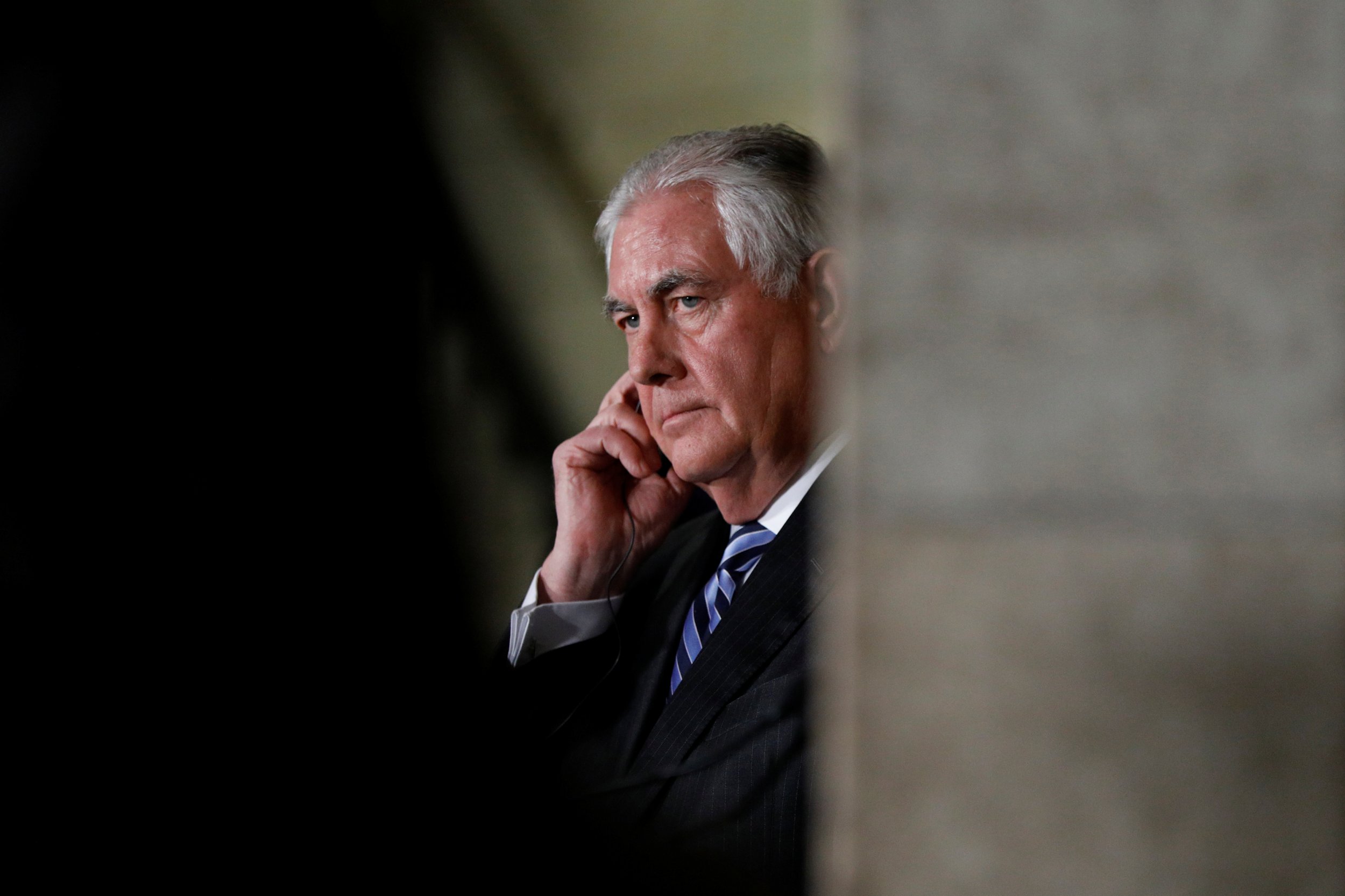
President Donald Trump called for "change" in Iran on Twitter, as protesters furious over economic conditions in the Islamic regime marched in the streets on New Year's Day.
When more than 20 protestors were reported to have been killed by Iranian authorities Wednesday, Trump said in another tweet the protest movement would get support from the U.S. "at the appropriate time!"
Yet Trump's top diplomat Rex Tillerson was conspicuously silent on the protests, sending the State Department's chief spokeswoman Heather Nauert to take reporters' questions about it Wednesday rather than speak for himself.
America's ambassador to the U.N. Nikki Haley—who sits in a position that is usually an arm of State Department diplomacy—eclipsed Tillerson and backed up the president publicly, calling Thursday for a U.N. Security Council meeting to "discuss the troubling and dangerous situation in Iran."
"This is a matter of fundamental human rights for the Iranian people, but it is also a matter of international peace and security," Haley said, demanding a Security Council meeting on Friday.
Again, Tillerson was silent.
This may not be a bad thing. If Trump and Haley actually care about human rights in Iran, says Andreas Krieg, a Middle East expert and Assistant Professor in the Department of Defence Studies at King's College London, they would do well to take a page from Tillerson's strategic silence.
Read more: Tillerson says State Department cuts will be fine because U.S. will solve more wars
By embracing the protesters and saying the U.S. is willing to support the movement against the Iranian government, "I think they are actually fuelling the narrative of the regime, which is saying that [the protests are] the doing of external agents," Krieg tells Newsweek . "That's very much counterproductive."
"I think this is one reason why Tillerson is very hesitant to jump on that bandwagon, because anything that comes out of the White House regarding Iran is very much part of the new conservative agenda that we see in Washington," he says.
The Trump administration has never had a grand a strategy on dealing with Iran, Krieg argues, apart from the president saying he doesn't like the regime and the deal to curb its nuclear weapons program, struck by former President Barack Obama, America's allies in Europe, and Russia in 2015.
Tillerson differs from Trump in this respect, because he has publicly backed the deal. The accord lifted U.S. and European sanctions that had crippled the Islamic republic's economy in exchange for bolstered global security. The hope was that rising prosperity in Iran would bolster a moderate agenda.
Tillerson's approach to global diplomacy has broken with Trump's on multiple issues, including North Korea, nuclear weapons, Russia, and Iran. His silence, and especially inability to rein in Haley - nominally, at least, his subordinate - can also be read as a sign of his weakness in the administration, as he is often overruled by Trump.
As the former CEO of the oil giant Exxon Mobil, Tillerson "definitely understands strategy and the importance of strategy and I think that is one reason why he doesn't just take [Trump's] side in this," Krieg says.
"It's like playing with fire, especially when you know the Trump administration is so supportive of what's going on in Saudi Arabia," he continued, pointing out the Saudi regime has "very much" the same problems as Iran when it comes to the economic conditions of its citizens.
By embracing the protests wholeheartedly "I think you know you could be seen as potentially embracing something that might soon be happening in Saudi Arabia," which Trump has positioned as a key American ally in the Middle East.
America's hesitation over the nuclear deal has hampered investment in the country from businesses in the West, wrote Alexander Kliment, head of global research at the business risk consultancy Eurasia Group early this week, as the protests saw thousands of Iranians take to the streets.
"Most of the economic gains from the opening that resulted from the Iran nuclear deal have gone to the oil sector, leaving ordinary Iranians no better off," he said, pointing out that unemployment is above 12 percent, youth unemployment is more than double that, and food prices are soaring.
If the Trump administration really wanted to empower Iran's President Hassan Rouhani to push through changes that modernize Iran and make it more moderate by increasing the economic prosperity of average Iranians, Krieg says, Trump would vow to stick to the nuclear deal and encourage investment instead of threatening to tear it up as he has since the 2016 election campaign.
Instead "everything has been about rhetoric," he says. "Most of the Iranian protesters on the street don't want any Western backing because you know rhetoric is not really helping them in achieving their goals."
Uncommon Knowledge
Newsweek is committed to challenging conventional wisdom and finding connections in the search for common ground.
Newsweek is committed to challenging conventional wisdom and finding connections in the search for common ground.
About the writer
Graham Lanktree covers U.S. politics for Newsweek. He is based in London and frequently appears as a contributor on BBC ... Read more





